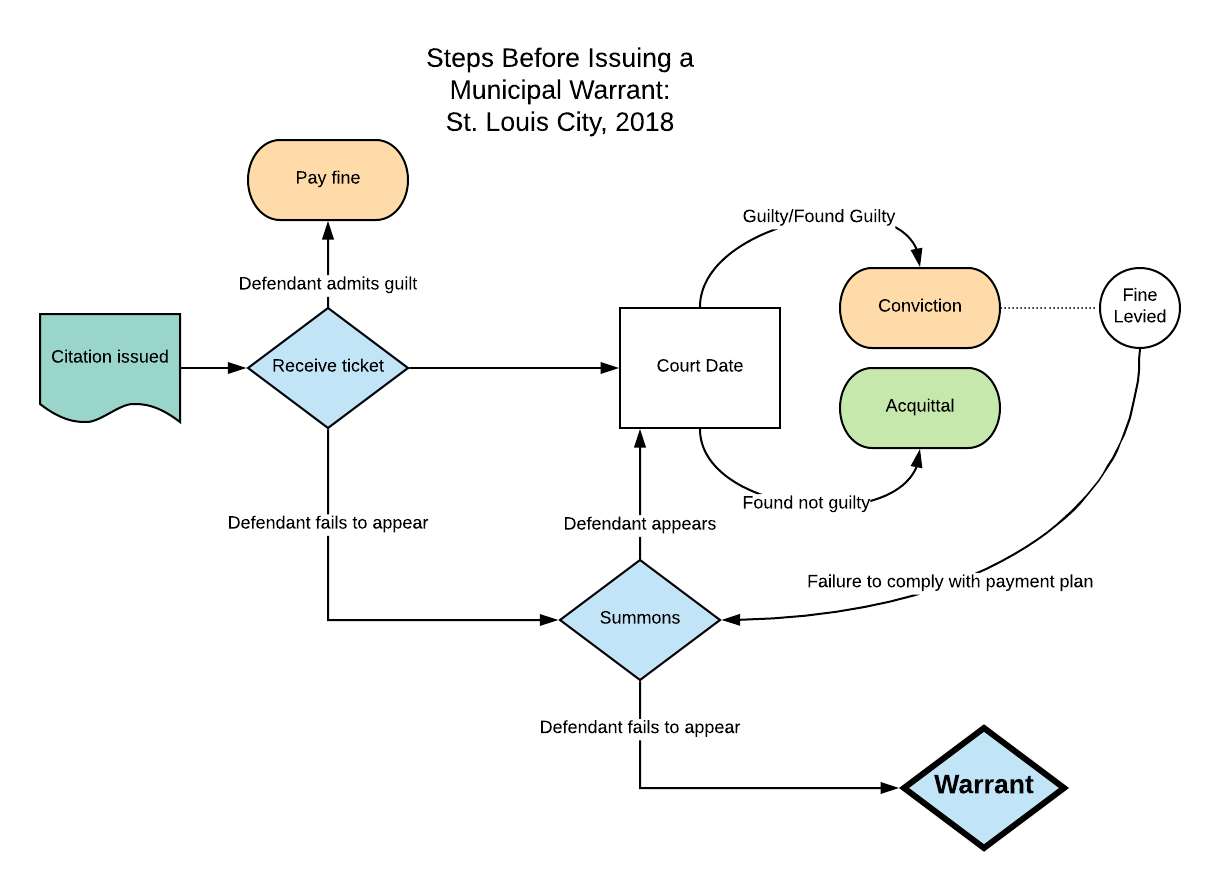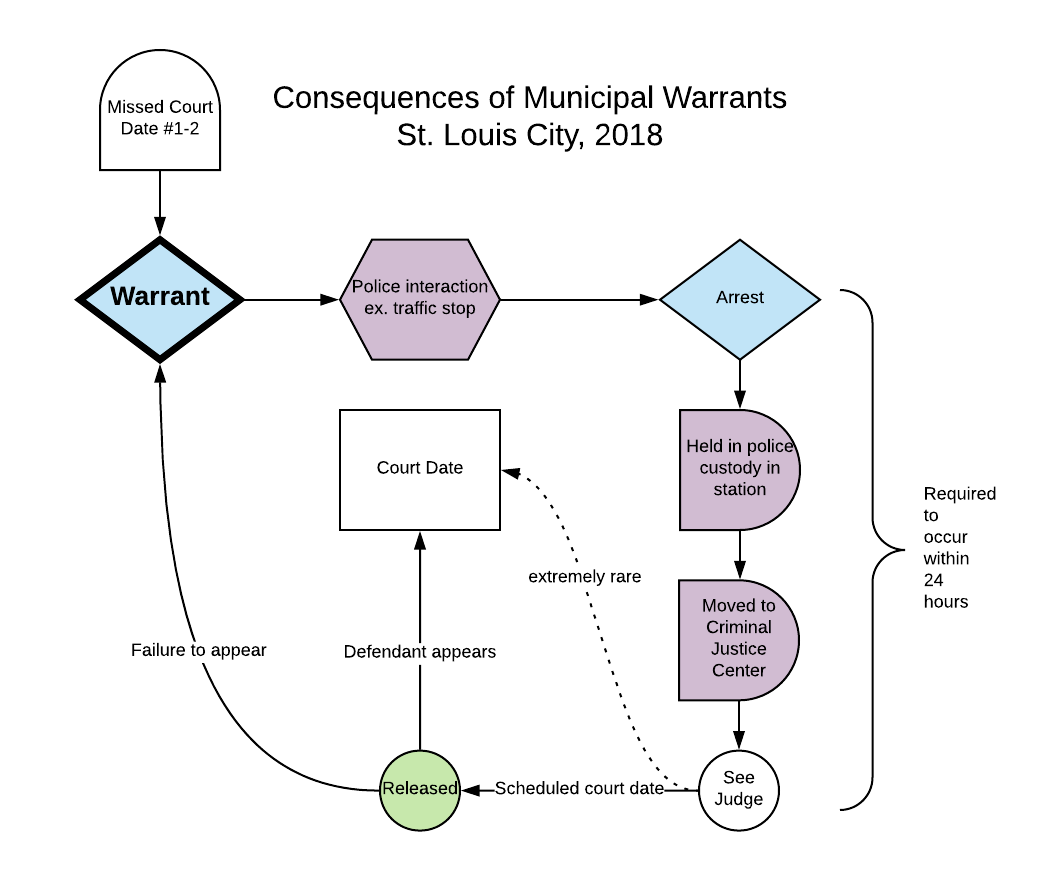Municipal Warrants
The rate at which warrants are issued by St. Louis City Municipal Court to St. Louis residents per 1,000 residents
A black person is more than twice as likely to be arrested for municipal violations as a white person.
A score of 100 represents racial equity, meaning there are no racial disparities in outcomes. The lower the Equity Score, the greater the disparity.
For Municipal Warrants, a score of 100 — a score reflecting racial equity — would mean black and white residents are equally likely to be issued warrants by Municipal Court. It is important to note that for this indicator, equity is not our only goal: we also want to improve outcomes for all.
More Information
What does this indicator measure?
Municipal Warrants measures the rate at which warrants are issued by St. Louis City Municipal Court to St. Louis residents per 1,000 residents. Warrants are issued when defendants fail to show up for two or more court dates and/or fail to pay outstanding fines and fees for municipal ordinance violations. In 2017, the St. Louis City Municipal Court issued 43,654 warrants to residents in 459 zip codes. Of those warrants, 28,667 warrants (66% of all warrants) were issued to residents of St. Louis City, for a rate of 93.8 warrants per 1,000 people.
Municipal Warrants analysis
Warrants issued by St. Louis Municipal Court to city residents by zip code in St. Louis City.
| All | Majority- black | Majority- white | Disparity Ratio | Equity Score | |
|---|---|---|---|---|---|
| Warrants | 28,667 | 18,685 | 4,107 | - | - |
| Population | 305,573 | 122,902 | 107,077 | - | - |
| Warrants per 1,000 residents | 93.8 | 152.0 | 38.4 | 3.964 to 1 | 27 |
Data Source: St. Louis City Municipal Court, 2017. Zip code population calculated from American Community Survey 5-year estimates, 2012-2016.
Data Note: The rate does not constitute a unique number of residents who receive warrants. Residents may have received multiple warrants. Zip codes 63123, 63136, and 63143 were excluded from the analysis as a majority of their residents live in Saint Louis County. According to St. Louis City Municipal Court Administrators, race of the defendant is not detailed in the dockets the Court looks at when they determine whether to issue warrants.
What does this analysis mean?
The Municipal Court is four times as likely to issue municipal warrants to residents of majority-black zip codes than residents of majority-white zip codes. In 2017, the residents of majority-black zip codes were issued 152 warrants per 1,000 people, while residents of majority-white zip codes were issued 38 warrants per 1,000 people. Residents of no-majority zip codes were issued 5,875 warrants, for a rate of 78 warrants per 1,000 people.
If warrant issuance rates were equitable, the Court would have issued 13,966 fewer warrants to residents of majority-black zip codes.

Why do Municipal Warrants matter?
Municipal warrants are issued when defendants fail to appear for two scheduled court dates on municipal charges or when a defendant fails to comply with the payment plan agreed upon in court. When a municipal warrant is issued, defendants are arrested when they encounter police and are placed into custody until they can see a judge, who will release the defendant with a new court date. A defendant can be held for up to 48 hours on minor traffic violations and 72 hours on other violations before they see a judge and their case is disposed or the case is continued. The St. Louis City Municipal Court, in an effort to minimize pretrial detention, has created a confined docket where these types of hearings are held 5 days a week. The Municipal Court avoids having a person detained on traffic charges beyond what is required to schedule their next court appearance. However, the more charges a person has and continues to accumulate, the more likely they will be required to post a bond prior to release.
Minor charges can turn into major inconveniences for defendants and long-lasting trauma for the defendant’s children, whether or not they are present at the time of the arrest. Anecdotally, Better Family Life, a local nonprofit, found outstanding warrants for minor traffic offenses were a commonly reported reason for their clients being unable to retain employment. In addition, in Missouri, people with outstanding warrants cannot get their driver’s licenses or passports issued or renewed.
Which Calls to Action from the Ferguson Commission report are linked with this indicator?
The Ferguson Commission’s calls to action related to municipal warrants include those that would increase court attendance (and remove the need for a warrant in the first place) and those that would decrease the negative consequences of receiving a municipal warrant. These calls to actions include:
- Create a Municipal Courts "Bill of Rights"
- Communicate Rights to Defendants in Person
- Provide Defendants with Clear Written Notice of Court Hearing Details
- Open Municipal Court Sessions
- Eliminate Incarceration for Minor Offenses
- Cancel "Failure to Appear" Warrants
- Develop New Process to Review and Cancel Outstanding Warrants
- Schedule Regular Warrant Reviews
- Provide Municipal Court Support Services
Questions for further investigation
- Why are so many defendants missing their court dates?
- Why is there a racial disparity in Municipal Warrants?
- What can St. Louis do to reduce racial disparities in Municipal Warrants?
- What initiatives are currently underway to reduce racial disparities in Municipal Warrants?
How can I learn more about this issue?
In 2014, ArchCity Defenders released a white paper on regional municipal courts, comparing the number of warrants to the number of residents for the municipalities within St. Louis County. Note this paper does not discuss the St. Louis City Municipal Court.
